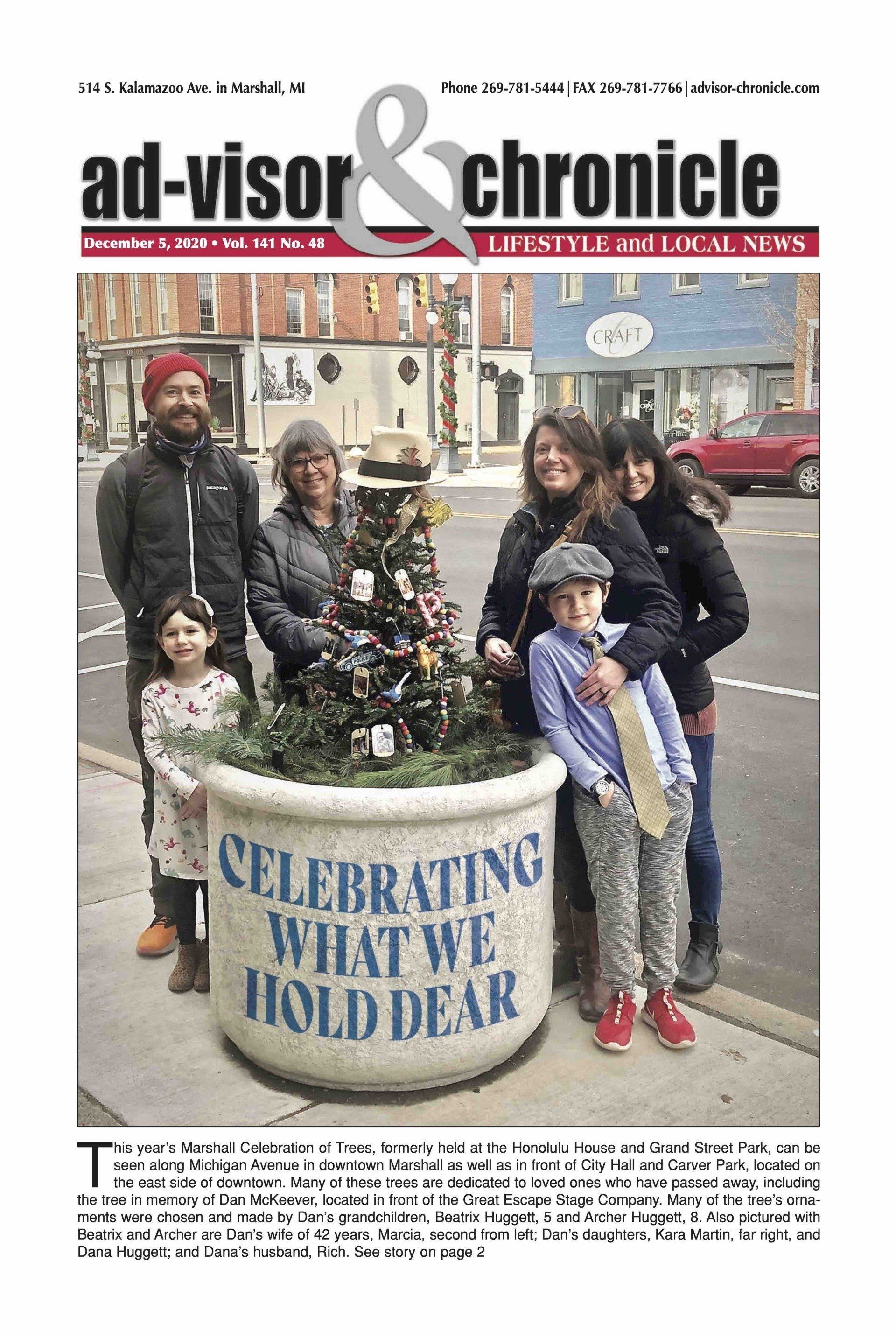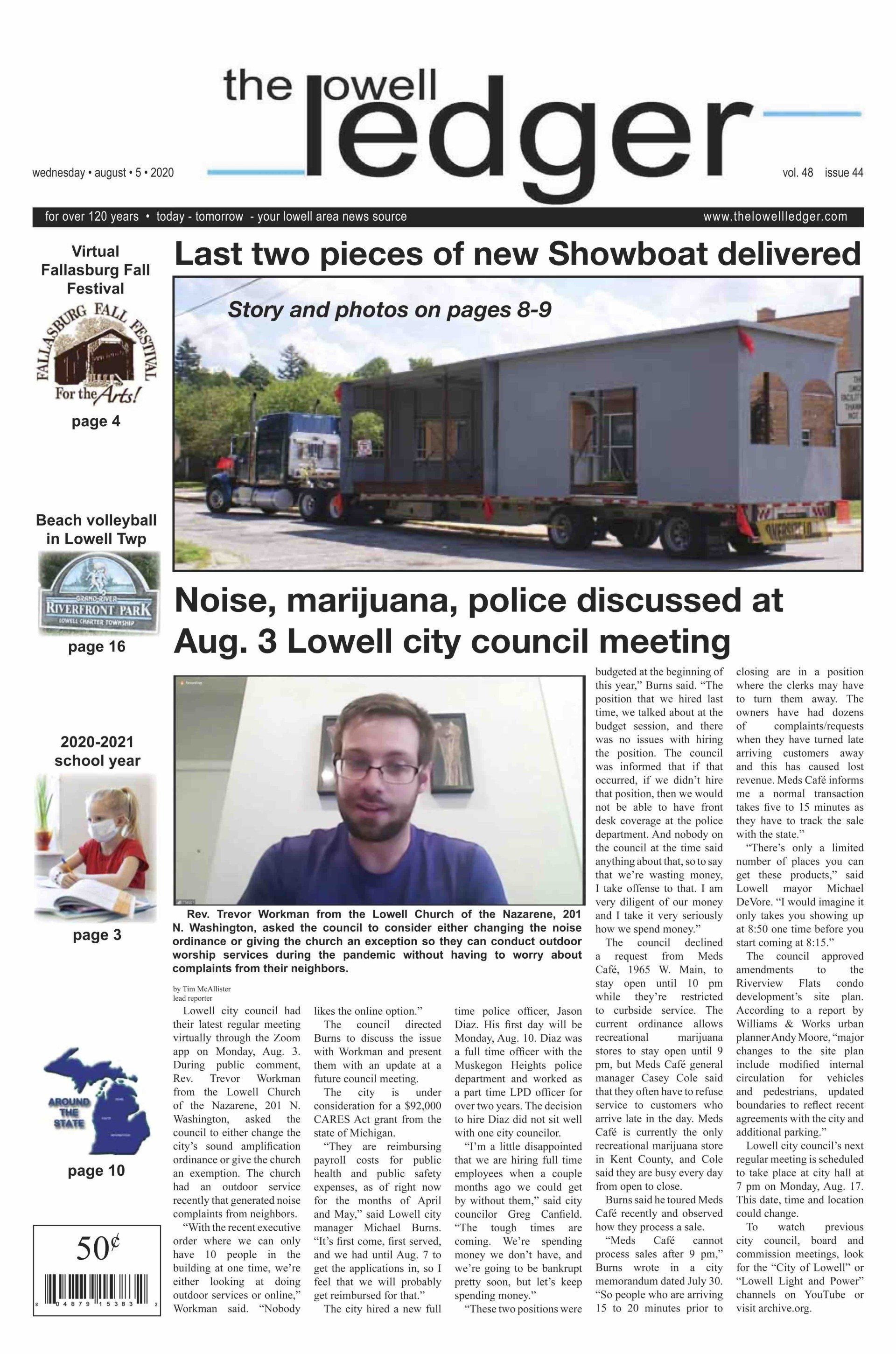Ferris to Sun Bowl, Raimann to Senior Bowl
Brett Bremer • December 30, 2021
Rollie Ferris, the former Central Michigan University offensive lineman and Delton Kellogg varsity football coach, is only half joking when he says he has told his family's foreign exchange student coordinator not to seek out any wide receivers to spend a school year with the Ferris family.
“I'll be like, 'nope,'” Ferris said. “I don't want no wrist band wearing guys. It won't work. It won't work in here.”
But, as Rollie's wife Marie Ferris certainly would agree with, sometimes the exchange student coordinator can know better than the 'head coach.'
The Ferris family, Delton Kellogg and now Central Michigan have received the best of both worlds in Bernhard Raimann.
Walking off the field at Delton Kellogg High School following a tough 46-14 loss to Saugatuck in October 2015, Panther varsity football coach Ryan Bates told the local sports reporter, “you're going to see him on Sundays.”
He wasn't talking about Saugatuck junior quarterback Blake Dunn who had just rushed for 359 yards and four touchdowns while throwing two more TD passes.
Bates was talking about his 6-6, 230-pound Austrian tight end Raimann – a senior foreign exchange student who came to the Panther program as a wide receiver with some club experience from back home across the Atlantic in Austria with the Vienna Vikings.
That wide receiver turned tight end has now turned into one of the best collegiate left tackles in the nation. Raimann, a junior in the NCAA's eyes, is forgoing a chance to play on another Friday in an effort to be certain he is ready for the NFL Draft on April 28, 2022.
Some NFL draft experts have the Central Michigan University (CMU) left tackle projected as a possible first or second round selection in the upcoming NFL
Draft. Raimann has played the past few seasons side-by-side on the Chippewas' offensive line with former Delton Kellogg and now current Central Michigan teammate Tyden Ferris – who he lived with as an exchange student during the 2015-2016 school year in Delton.
Tyden, a red-shirt sophomore in terms of NCAA eligibility, is with the Chippewas this week to take on Washington State Friday, Dec. 31, in the Tony the Tiger Sun Bowl. The trip to El Paso, Texas for the Sun Bowl comes after a late change to the bowl slate which originally had the Chippewas taking on Boise State in the Arizona Bowl in Tucson, Ariz. Dec. 31. Tyden has split his time at both guard spots and center over the years with the Chippewas.
“Now that I am at left guard, I like left guard a lot more,” Tyden said. “It is just muscle memory with my left foot back and everything gets kind of reversed at right guard. I liked a lot this year being next to Bernhard. It made things a lot smoother to know he was next to me on the outside.”
Raimann is skipping the bowl game, but will line up one more time before the draft as he has been selected as a Senior Bowl All-American and will get to play in the Senior Bowl in Mobile, Ala., on Saturday Feb. 5, 2022.
With the sophomore Tyden Ferris and the senior Raimann among the anchors on the offensive line the Delton Kellogg Panthers won five games in 2015 and earned a spot in the state playoffs for the first time since 2001. They were back together in 2018 with the Chippewas. Tyden was a red-shirt that fall.
Together they helped the Chippewas finish as one of the top rushing teams in the NCAA FBS this season.
Raimann won't be the first guy who walked off the field that October day in 2015 in Delton to get drafted. Dunn was selected in the 15th round of the 2021 MLB Amateur Draft this summer after a stellar collegiate baseball career playing for Central's rival Western Michigan Broncos. Dunn had a much more traditional route to the draft however.
Raimann arrived in Delton to join a football family, the Ferrises. Rollie, Tyden's father, played on the offensive line at CMU from 1995-1997 was second team All-MAC in 1996 and 1997 and named the team MVP at the conclusion of the 1997 season.
Raimann played one year of football at Delton Kellogg, hauling in 11 receptions at tight end for 248 yards and five touchdowns in the Panthers' run-heavy Wing-T offensive scheme. Raimann then had to return to Austria to fulfill the country's required year of military service before returning to Michigan to join the Chippewas as a tight end.
“We knew coming in that he was just a freak, even as a 17-year-old who hadn't graduated from high school yet,” Delton Kellogg head coach Ryan Bates said.
“The tangibles he brought to the table, his speed for his size and his strength for his size, he was built like a football player in a basketball player's body - just long and strong. We knew he was going to be very talented.
“Our offense doesn't use wide receivers and he had no problem transitioning to a tight end. And he was a very, very good blocker at wide receiver anyway, so he was just coming out of a different stance essentially, different footwork. He took to that very well and obviously that transitioned to him starting out as a tight end in college and even though he could catch the ball and he was talented with the ball in his hands, he is just a devastating blocker. When we watched him play at the high school level, he was getting holding calls simply because he was blocking people 15, 20 feet down the field and then would just truck them. They were calling holding and there was no holding to it. He was just destroying people, and officials didn't have another answer. He was just that good.”
Raimann had ten receptions as a tight end in each of this first two seasons with the Chippewas before transitioning to left tackle beginning with the pandemic shortened 2020 season. He started all six games at left tackle for the Chippewas in 2020.
“It has been pretty crazy,” Raimann said of his positional shuffle over the years. “I started out playing receiver and I knew about running routes and catching the ball. The first time I played on the line of scrimmage was in Delton, because we ran a Wing-T offense. That was the first time I learned how to block and not just a little cornerback out on the outfield somewhere. That kind of transitioned me to tight end and then I kept trying to gain some weight. Obviously, I started off as a tight end at central and then after my second season as a tight end I made the transition to O-line.
“I just kept moving inside I guess.”
Raimann said the move from tight end to tackle started at CMU when the coaches asked him to help fill in due to a lack of depth on the line due to injuries and graduations.
“I didn't know a thing, but they just kind of threw me in there,” Raimann said. “I ended up loving it from the very first practice, until we got shut down from Covid two or three practices later. But over the summer time, the o-line, the guys helped me out the most. We couldn't meet with coach, we could have full practices, but we got together in little groups. Tyden and Derek Smith and other O-linemen, they were really the ones that helped me out during that summer of transition.”
“He picked it all up pretty fast,” Tyden said. “It didn't take him long before he was telling me what I needed to do. He focused a lot on his footwork a lot and even his stabs. I don't think there is anybody on the team that watches as much developmental film as he was, even during the summertime when everyone else was at the pool, or the lake, or hanging out with friends I knew he was watching film, or I would drive by the football field or one of the soccer fields and he is out there by himself or with [his girlfriend] running. He's out there doing drills by himself, and I'm like 'what are you doing, it's summer time?'”
Marie Ferris, Rollie's wife, is an exchange student coordinator in the Delton area. The couple have hosted close to a dozen exchange students themselves over the years.
“I look for kids and I look for good families and I try to match them.” Marie said. “I think the most important thing is to make a good match. It is not good to just take any exchange student and throw them in any home. Life is good if you can find a good match. I work really hard at doing that. But, you're not a coordinator for your own exchange student. So, I have my own coordinators for that.”
“I just told my coordinator, please look for a boy who would like to come to the United States and play football,” Marie said.
It was a match made in football heaven. Bernhard was Rollie and Marie's fifth exchange student, and the first boy they hosted.
It takes something to impress a Ferris, like with Tyden seeing Bernhard working alone during the summer in Mount Pleasant, with hard work. Rollie put
Bernhard to work on a job site the day after he arrived in Delton.
“I got picked up from the airport and everything, and the day after we got to spend the day at Grandma Ferris' house,” Raimann said, “and then the day after that we were on the job site with Rollie working which was tough at the beginning, but I just got to learn so much about handy stuff that helps me in every
day life and a lot of manual work I wasn't used to up until that point.
“To see how much they work for each other, and the dedication they do it with really rubbed off on me for my work ethic and what I want to do with my family. I learned a lot.”
“A guy that tall and that strong on a job site is great,” Rollie said.
Bates could certainly see the fit between Raimann and the Ferrises. He said called Bernard's work ethic extraordinary and the Ferris family's work ethic freakishly strong.
“The family will go to the weight room and lift and then put a roof on a house,” Bates said.
Those kids are built that way, and Bernhard jumped right in with that same mentality and the two that are at Central right now, between Bernhard and Tyden, they live in the gym. They work their tails off and the younger one is going to go wrestle. The same thing. The work ethic that all three of those boys have is incredible.”
Tyden's younger brother, Caden, a senior at Delton Kellogg this year signed his National Letter of Intent in November to wrestle at CMU next season. Caden won the state championship at 215 pounds at the MHSAA Division 4 Individual State Finals in April, and like Bernhard opting out of playing in the bowl game Caden opted out of a senior football season in an effort to stay healthy for collegiate wrestling.
There was no sitting on the sideline though. Caden spent the fall splitting time between the Delton Kellogg varsity boys' cross country team and the varsity boys' soccer team where he teamed with current Ferris family exchange student Giovanni Stea in helping the boys' soccer program to its first ever district championship.
Tyden was a four-time state medalist in wrestling himself in high school, finishing as a state runner-up in Division 3 twice including at 215 pounds in 2016 the year he had Raimann as a practice partner in the wrestling room.
Bates said the only time he saw Raimann have a tough time with something on the football field in high school was dealing with an injury. Raimann said every wrestling practice was tough.
“Definitely tough,” Raimann said. “I don't think very many people start their wrestling career by practicing against an all-state wrestler. It wasn't always easy, but then again I think it did prepare me for college and it made me a better athlete overall. I am thankful for the experience.”
Tyden and Raimann were also a part of the DK varsity boys' track and field team in the spring of 2016. Raimann won Southwestern Athletic Conference Valley Division titles in the 300-meter intermediate hurdles and the high jump and qualified for the MHSAA Division 3 Lower Peninsula Track and Field Finals in the 300 hurdles.
Tyden went on to qualify for the state finals in the shot put and discus in his junior and senior seasons and was the Division 3 state runner-up in the shot put as a senior.
Tyden wasn't the first of his siblings to be a college athlete. His big sister Faith Ferris helped Delton Kellogg's varsity volleyball team to the state semifinals in Class C in 2011 and went on to play at Cedarville University.
With a red shirt freshman season and a pandemic shortened year, Tyden still has two years of football eligibility left at CMU. He plans to play with the Chippewas in 2022 and he'll decide on a sixth year in Mount Pleasant after that. He expects to wrap up a Bachelor's degree in marketing and sales by December of 2022.
Raimann earned a bachelor of science degree with a double major in statistics and actuarial science last May and is now working towards a Master's of Science in Administration and is currently eligible for Academic All-America honors.
Coach Bates hasn't been able to see his two former players in person as much as he'd like, what with the responsibilities of running the Delton Kellogg football program on the weekends. He did get to attend this year's Central/Western game (a 42-30 CMU victory Nov. 3), and has been thankful for the chance to watch a few more games on television or online.
“It has been pretty fun to watch those two play together side by side, especially when they're running zone schemes and those two are double-teaming some poor sucker. It is pretty fun to watch.”
The bowl game change means Tyden and the Chippewas will be playing on national broadcast television Friday, at noon on CBS. Both Tyden and Raimann were a part of CMU's last bowl appearance, a 48-11 loss to San Diego State in the 2019 New Mexico Bowl.
Tyden is looking forward to being in a second bowl game.
“I just think the experiences are fun, the memories and everything you're going to take with you for the rest of your life. It is a little getaway too, something new that you don't get from Michigan or even Delton,” Tyden said.

A new court date has been set for a 24-year-old Battle Creek man accused of threatening campers at the Welcome Woods campground in Carlton Township last month. Trevor Dean Leiter is scheduled to appear for a probable-cause conference June 15 in District Court 56B. A conference had been scheduled for last week but was adjourned, court officials said. Leiter is charged with three counts of felonious assault and one count of reckless use of a weapon in connection with the May 16 incident at the campground on Welcome Road, north of the city of Hastings. Michigan State Police received a report of a domestic dispute involving the suspect and his girlfriend. Prior to troopers arriving, Leiter threatened people at the campground and started “shooting rounds into the air from a handgun he had pulled out of a backpack,” the Barry County Sheriff’s Department reported. When troopers arrived, Leiter initially refused to exit the RV, and officers surrounded the vehicle. The Barry County Sheriff’s Department Special Response Team was called to assist. “Members of the SRT were able to quickly control of Leiter and handcuff him to the rear [of the RV],” the sheriff’s department report said. “After standing him up and trying to escort him to a patrol vehicle, he began resisting. Leiter had to be pushed towards the patrol vehicles. Leiter became more resistant and had to be brought down to the ground and held down.” Once in the patrol vehicle, Leiter kicked at the windows in the vehicle. Then at the jail, Leiter continued to resist corrections officers and had to be placed in a restraint chair, according to the sheriff’s department report. The girlfriend escaped without injury, and no one else was hurt in the incident. Leiter is being held on a $10,000 bond in the Barry County Jail.
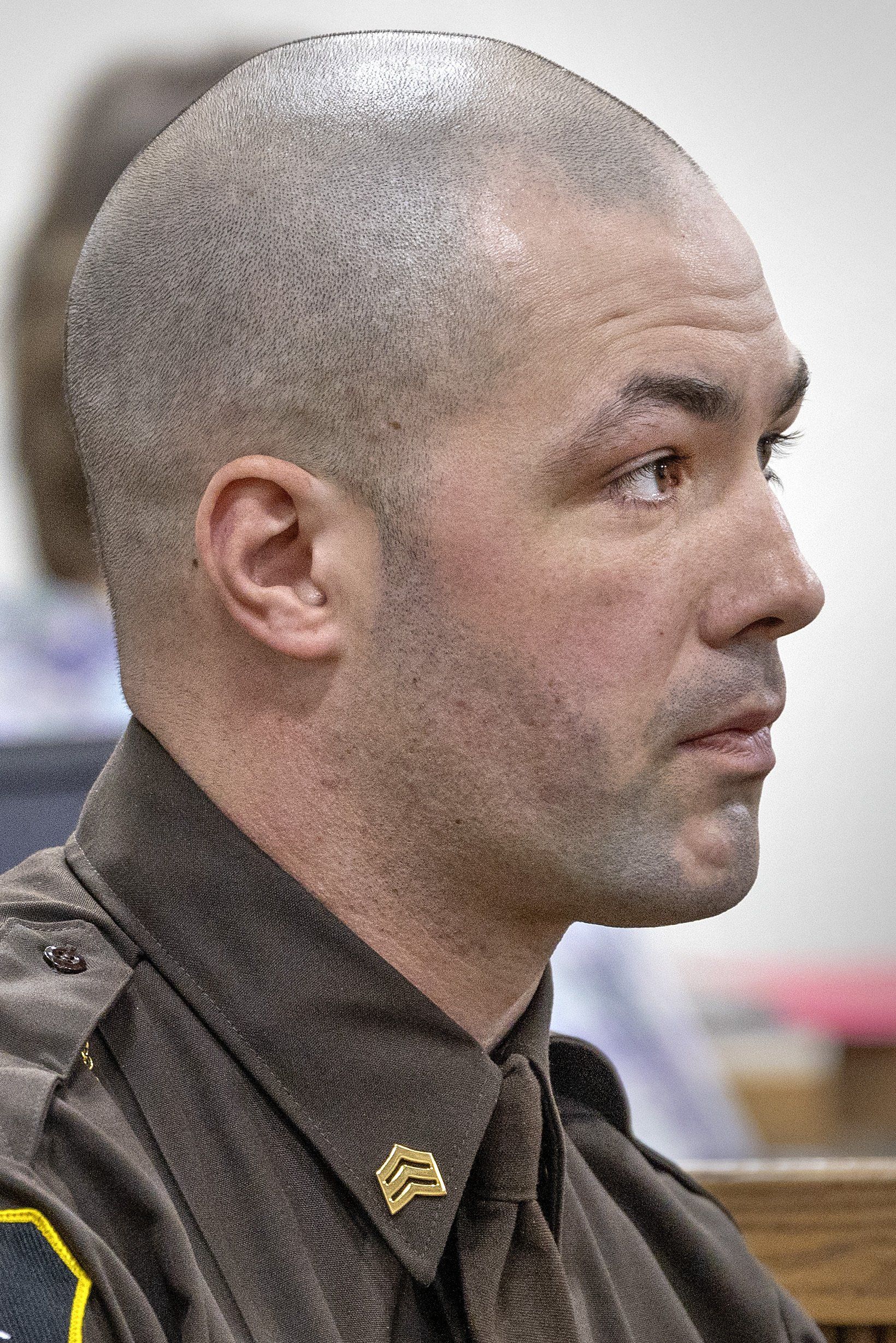
Sgt. Scott Ware with the Barry County Sheriff’s Department received the 2022 Police Officer of the Year Award for his actions during an Aug. 4, 2021, car chase and shootout in Woodland. Ware was recognized by the Police Officers Association of Michigan at its annual convention in Grand Rapids. “For bravely putting the lives of others before his own by stopping an armed shooter before he could do any real harm, Sgt. Scott Ware is one of the Police Officer of the Year award recipients,” a press release reads. “The teamwork of all officers on the scene and the courageous, tactical decisions of Sgt. Ware allowed the whole incident to end without any civilian or police officer casualties.” Undersheriff Jason Sixberry said the department is lucky to have Ware. “Scott’s done a great job here and with everything he’s done to keep the community safe,” Sixberry said. “We’re proud of him and his accomplishments and him receiving the award. It’s a pleasure of ours to have him go from a deputy up to a sergeant position, being able to instill his good values and hard work ethic in the department.” The encounter started when police were alerted that Timothy Riddle was suspected of stealing two shotguns from a Hastings resident on the 1000 block of North Coville Road. Police in the area were notified to keep a lookout for Riddle. A Hastings City Police officer saw Riddle’s vehicle at a gas station on M-43 in Hastings at 6:48 p.m. that night. Riddle was stopped by police as he was leaving the station. When police started to question Riddle, he grew agitated and sped off, heading north on M-43. Police reports and testimony in court said Riddle reached speeds as high as 115 mph. Officers from the city police and the sheriff’s department, including Ware, joined the chase. Police reported that Riddle pointed a shotgun out the window at pursuing officers throughout the chase. The chase ended at the Mobil gas station parking lot on M-43, east of Woodland. Police reported that Riddle leveled a shotgun at officers after exiting his vehicle and began approaching them. Ware, who was still inside his police cruiser, readied a rifle and fired several shots through the windshield of his vehicle. Those actions are credited with causing Riddle to stop shooting and retreat into the gas station. One customer escaped and two employees hid inside the store. They later were able to leave the station unharmed, police report. Riddle barricaded himself inside the station for seven hours while police negotiated with him. The standoff ended at 1:30 a.m. when Riddle surrendered himself to police. He was later convicted of 21 criminal counts. During Riddle's trial, Barry County Judge Michael Schipper reviewed the incidents as they had occurred that day. Remarkably, the judge pointed out, no one was hurt. That was because of the police officers who responded to the scene, he said. And Ware was a key reason for that, according to the police officers association.
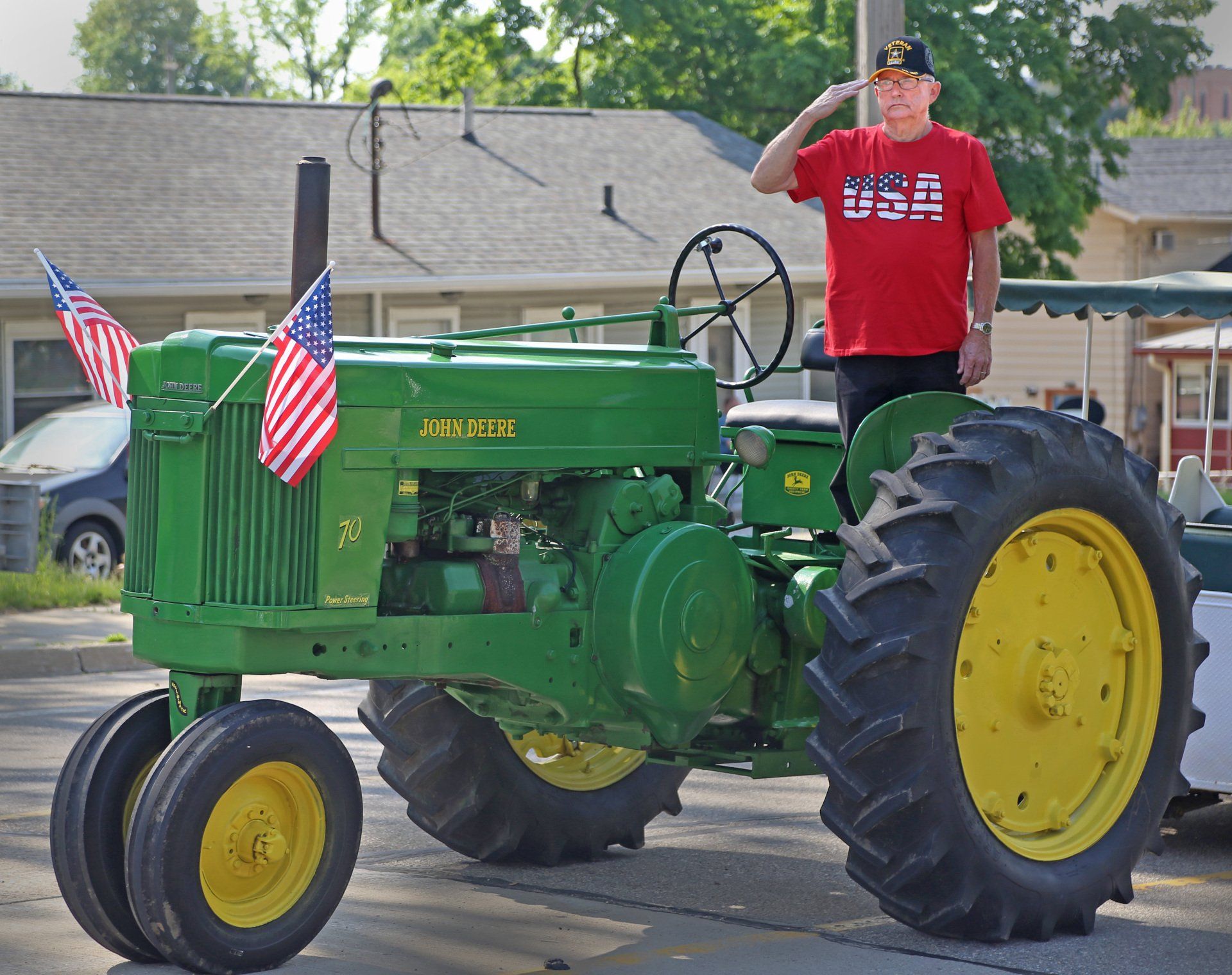
Despite a near 90-degree forecast, a strong breeze from the south kept participants and spectators comfortable as the annual Memorial Day parade wound through Hastings Monday morning. The event, hosted by Lawrence J. Bauer American Legion Post 45, made its traditional stops, pausing at Tyden Park and the bridge over the Thornapple River before ending at Riverside Cemetery. The parade stepped off at 9:30 a.m. from the intersection of Boltwood and State streets, with the Legion’s color guard, followed by the honor guard, Legion members and other veterans, National Guard and Reservists, Legion Auxiliary, Legion Riders, the local Disabled American Veterans chapter members, Sons of the American Legion, Scouts, Hastings Area Schools Marching Band and other participants. They walked through downtown, making their way to the Veterans Memorial at Tyden Park, where attendees heard a speech from Steve Carr, an Air Force veteran. Carr served as the commander of Post 45 for three years before taking over as the current Michigan District 4 forward commander. He began his speech by honoring the final 13 U.S. service members who lost their lives in Afghanistan. He shared a little bit about each person – their names, where they came from and details about their lives. “Not only are these diverse men and women forever in our hearts, but for those who knew him, they are forever young,” he said. “They came from every background, yet they shared a common goal: To serve America and make life better for others.” Carr went on to highlight the importance of Memorial Day. “Memorial is not about picnics and parades, though there is nothing wrong with enjoying and celebrating our American way of life,” he said. “Memorial Day is about gratitude and remembrance. It is about honoring the men and women who made it possible for us to gather here today in peace. But the reason there is a Memorial Day, the reason we gather here, is to remember who made our way of life possible. They truly are the guardians of our freedom.” Following Carr’s speech, two wreaths were placed at the memorial. One wreath honored all veterans and the other honored prisoners of war and those still missing in action. The group then made its way to the bridge on Broadway, where a wreath was tossed in Thornapple River to honor those who have served or are serving at sea. Both stops included a rifle salute by the Post 45 honor guard, followed by playing of taps by two Hastings High School band members. The parade then moved to Riverside Cemetery where a brief ceremony took place, as it has for many years, near the Grand Army of the Republic marker, beyond the Avenue of Flags. Those 43 flags, Jim Atkinson pointed out, were donated by the families of 43 veterans, who were presented the flags at the time of the veteran’s death. Throughout the large cemetery, Atkinson said, another 500 or so small U.S. flags mark the graves of veterans buried at Riverside. As in the past, local Scout groups helped place the flags in recent weeks. Youngsters and adult volunteers finished the work in about an hour and a half, a grateful Atkinson said. Unlike in years past, a wreath was not placed on the grave of the most recently deceased veteran at Riverside. Dr. Paul Sweetland, who served in the U.S. Army’s 82nd Airborne during the Vietnam War, died in early March. Atkinson said full military honors were conducted during Sweetland’s burial just a few weeks ago. So, the wreath placed at the GAR marker was the final wreath placed Monday. Barry Wood, recent commander of the state American Legion and a Hastings resident, spoke for a few minutes. Like Carr, Wood reminded people of the purpose of Memorial Day. “This is the day we pay homage to all those who served in the military and did not come home. This is not Veterans Day. This is not a day for celebration. It’s a day for solemn contemplation over the cost for our freedom. “Memorial Day was born of necessity. After the American Civil War, a battered United States was faced with the task of burying and honoring the 600,000 to 800,000 Union and Confederate soldiers who had died in the single bloodiest military conflict in American history. “The first national commemoration of Memorial Day was held at Arlington National Cemetery on May 30, 1868, where both Union and Confederate soldiers are buried. “Every veteran takes this oath,” Wood continued. “The ones we honor here today make the ultimate sacrifice while carrying out this oath. “Veterans, you will remember this, and I quote: ‘I do solemnly swear that I will support and defend the Constitution of the United States against all enemies, foreign and domestic; that I will bear true faith and allegiance to the same; and that I will obey the orders of the president of the United States and the orders of the officers appointed over me, according to regulations and the Uniform Code of Military Justice, so help me, God.’ “We here today thank and honor those veterans who took this oath and cannot be here. Each veteran here, and those across this nation, understand what taking this oath means. It is a gift, or a pledge, of their lives to you and to all in the United States of America. That oath is a major part of who we are in the military. It forms the bedrock of what we stand for and … are willing to fight for. “Some of you may know a soldier, airman, sailor or marine who did not come home: “I am an airman. I do not choose the time or place. Convenience is not in my vocabulary. “I’m a soldier. I stand at the ready. When my orders come, I go. “I’m a sailor. The job I’m given to do, I do. Even if it costs me my life, I will do it. “I am a marine. Yes, take me home, but only when the job is done, only when the job is done. “I pray for each family that has lost a veteran, never having a chance to say ‘good-bye.’ “Let us never forget,” Wood concluded.
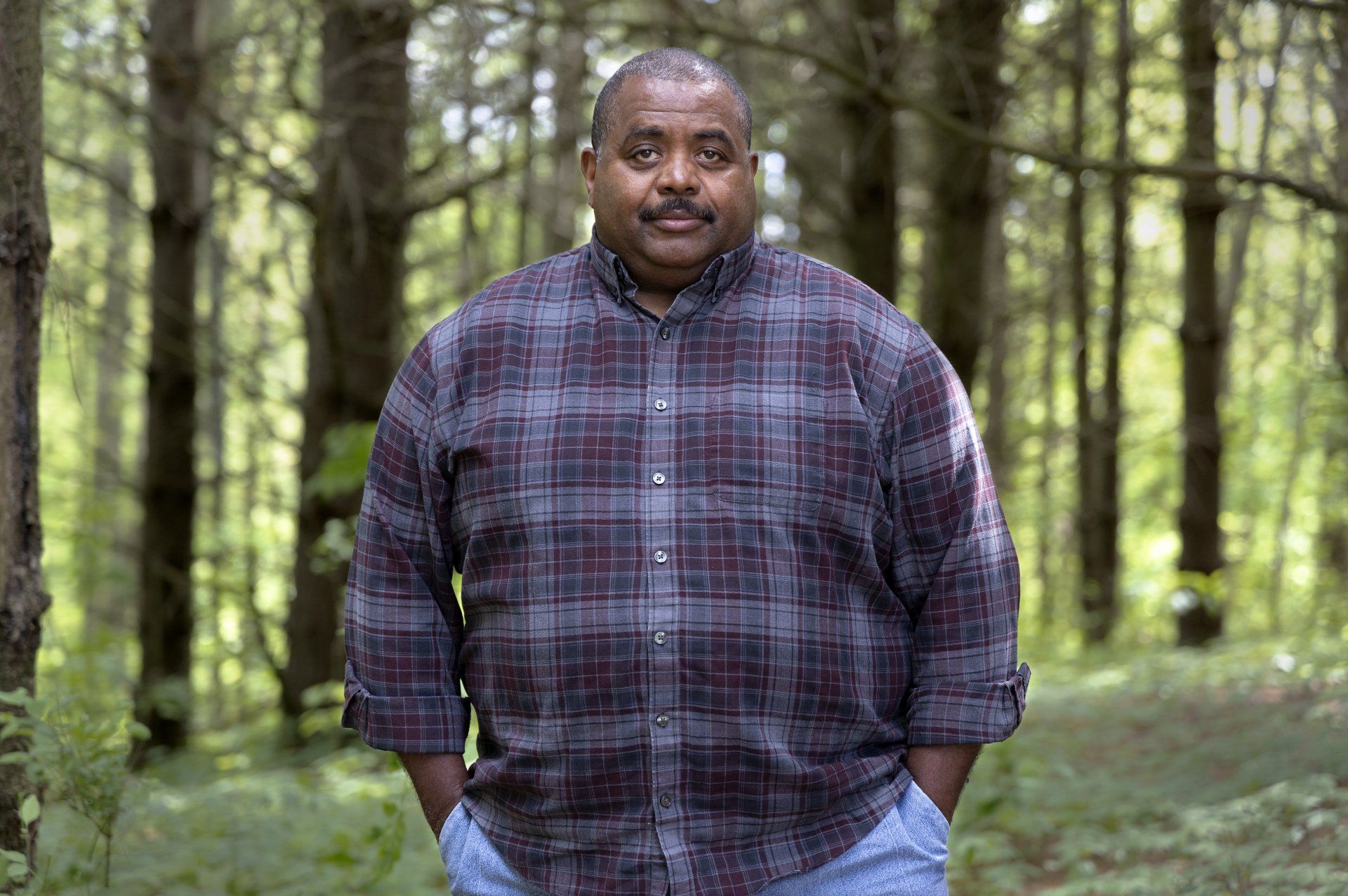
They told him Black people didn’t live in Barry County, but Darryl Newton didn’t care. One day in 1997, his wife, lost in the backroads of Barry County, stumbled on a house. It sat at the end of a dead-end gravel road surrounded by woods. She called him right away. She told him she had found their house. Despite warnings about Barry County from his coworkers at Meijer in Grand Rapids, Newton has lived in Barry County for 25 years. He refers to the county as “Barry,” as if it’s a longtime friend. He cherishes the peace, the quiet and the fact that he doesn’t feel pressure to always lock his doors. It’s where he has raised his kids, sent them to school and, as a self-described “football nut,” logged nearly two decades as a football coach. For five years, he volunteered with the Hastings youth football program, spending every Saturday, 8 a.m. to 8 p.m., coaching, announcing and serving up food. People still know him as the “pickle guy” because he stocked the snack stand with this fan favorite. Later, he would coach football in Middleville for 12 years, serving as both the president and vice president of the youth league. “It's a great community. I’ve loved living here, it’s just...” he said, pausing and sighing, “you have to get used to it.” Darryl Newton is a 59-year-old man from Ypsilanti who cheers for the Philadelphia 76ers, likes to hunt, loves to grill, served in the military, goes to church and lives in Barry County as a Black person. He could work in Barry County and live in Grand Rapids, Lansing, Battle Creek or Kalamazoo. Each has a larger Black community, but he chooses to live in Barry County, which is 96.6 percent white and 0.7 percent Black. Hastings is just 0.1 percent Black. The Hastings Banner spent more than a month with Black residents in the community to learn more about their daily experiences in Barry County. Many said they enjoy living here and, for the most part, people in the community treat their families with kindness and decency. But many admitted to feeling like outsiders. All have experienced some form of racism. There’s one memory that sticks with Newton. A few weeks after arriving in Barry County, Newton’s son came home with bumps and bruises. As he had walked in Hastings, a few kids picked a fight with him. They called him a racial slur typically directed at Black people. But Newton wasn’t surprised. “This is normal, it's going to happen,” he told his wife, “and it's going to happen to him again. And again.” Growing up in Barry County Isaac Schipper was the only Black student in his grade from first grade to high school graduation at Thornapple Kellogg Schools. And everyone knew it. “Oh, that's Isaac,” other students would say when new people visited the school, “you'll recognize him right away. He sticks out.” “That's just a fact of living out here,” Schipper said. “Black people stick out like a sore thumb.” Schipper, 29, was adopted by white parents. His father is Barry County Judge Michael Schipper. Isaac identifies as bi-racial, with white and Black biological parents, although he said most people see him as Black. He graduated from Thornapple Kellogg in 2011, where he was a lineman on the 2010 all-conference football champion team. He attended Grand Valley State University and studied psychology – a result of “years of watching ‘Scrubs,’” he said. He spent a few years working in a hospice facility, but the experience left him burnt out and he started to think about a new career. In 2017, he took a job working in cafeterias in the Grand Rapids Public Schools and, in 2018, enrolled at Ferris State University to pursue a teaching degree. Before leaving Barry County, Schipper never really spent much time around other Black people. “There's not really any kind of Black culture out here is the best way to put it,” Schipper said. That changed when he moved away from Barry County. Going to college, working in Holland and living in downtown Grand Rapids made him more aware of the experiences of other people of color. But Schipper said he has never felt unsafe or threatened in Barry County. “There haven’t been a whole lot of racial encounters,” he said. He would recommend Black people live in Barry County. Schipper continues to live in Barry County while he works as a substitute teacher at Thornapple Kellogg. After finishing his degrees, he wants to return there permanently to teach in his childhood district, hopefully in fourth or fifth grade. Still, there’s one instance of racism that Schipper remembers: When he tried to date a girl. They started by flirting in gym class. They became close and Schipper visited her house, where her father watched his every move. Eventually, Schipper asked her to date. But she made excuse after excuse. After a while, she told him the truth – her father “didn’t feel comfortable” with them dating because of his skin color. Over the following year, her father became more comfortable with Schipper, but it was a revealing moment for him. “No one's going to say, ‘Oh, I'm against diversity,’ until it affects their lives personally,” he said. Blending in From the age 7 to 17, Vincente Relf Jr. never lived in a place for more than two years. Financial troubles, family disagreements or a change in jobs -- something always caused his family to relocate. He bounced around from Detroit to Southfield to Dearborn, even living in a shelter for a short period of time. In each place, he had to learn how to fit in. Relf, 26, calls himself a “chameleon.” “My whole life story is blending in, dude,” he said. A few weeks into his junior year of high school, Relf packed his life into five Kroger tubs and moved in with his sister in Grandville, a suburban community near Grand Rapids. Grandville required a different type of blending in. In Dearborn, his school was split almost evenly between white, Black and Arab students. In Grandville, he said there were maybe 20 Black people in the entire district and not many other people of color either. He felt the lack of diversity from the moment he arrived. People assumed he knew how to break into cars. One classmate said that she didn’t understand him because she “didn’t speak Black.” But Relf wanted to fit in. “I wanted to feel like I belonged because I live here now,” he said. “This is my home. I have to find a way of belonging. People are more accepting when you talk like them, sound like them, look like them, right?” Relf threw away his old clothes. When he walked home from school, he practiced speaking without slang. Relf said it gets exhausting, having to constantly code switch and change. But he said he “had to adapt to survive.” “I wanted to give people that different experience and I knew that when people saw me, if I talked the way that I talked, they were immediately going to categorize me as the Black guy they see on the news that has committed this crime,” he said. In 2018, Relf graduated from Davenport University with a degree in business management. Looking to buy a house and build some equity, he stumbled onto a place in Middleville with a big lot and the perfect amount of natural light. In September 2020, he made Middleville his home. In the back of his head, he wondered if he would find racial epithets scrawled on the front of his house. Within weeks, though, he felt more welcome. A local basketball coach invited him to play pick-up. Unprompted, a neighbor who looked like Santa Claus would plow his driveway after it snowed. Relf calls a different neighbor “the greatest guy ever.” Occasionally he’ll get the “oh, crap, there’s a Black guy in Middleville stare.” But he said that he “loves living in the country.” He loves the quiet, abundant space and having a home to call his own. When Relf calls his family in Detroit, he doesn’t think about how he speaks. But as he walks in Middleville, Relf said he is always conscious of how people see him as a Black man. “I'm always Black,” Relf said. “I will always be Black. I'm always aware that I'm Black. I don’t know, it’s just something I’m always aware of. I’m never not Black.” For the most part, Relf sticks to himself in Barry County. When he wants to do something fun, he heads to the Grand Rapids area. The summer concerts and downtown events here don’t appeal to him, and when he looks around, he sees no one who looks like him. “I feel like there's a community,” he said. “I just don't know if I feel a part of the Middleville community.” ‘Just wading in the water’ At church this past weekend, they shared petitions for prayer. As Desiree Holley-Sancimino sat in her pew, she couldn’t help but think about the Buffalo grocery store, where 10 Black people were murdered May 14 by a gunman under the sway of white supremacist ideologies. “The climb is very hard,” she said. “I cry out to the Lord, when is it going to end? Then we got this shooting in Buffalo now. This guy comes 200 miles away, he's checking out the climate, what people are shopping at the store and then sets up to murder people just because they're of a different color.” The prayer petitions asked for “hate to stop in the country.” They mentioned Ukraine. But none directly discussed the heinous shooting in Buffalo. Holley-Sancimino was disappointed. “We have to acknowledge that it exists,” she said. “We can't push it aside or use vague language.” Holley-Sancimino, 69, has witnessed and experienced racism during her entire life. Her great-great-great-grandfather woke up one morning in Mississippi to a burning cross on his front yard. After Holley’s grandparents came to Detroit, Holley-Sancimino’s mother was denied a job because her skin was “too dark.” Her brother was later bussed to a new school and told to “go back to Africa.” Holley-Sancimino has continued to deal with racism, even in Hastings. In the fall of 2021, her 11-year-old granddaughter was called a “dirty girl” as she stood on a sidewalk downtown. Holley-Sancimino called moving to Hastings a “culture shock.” She was born in the 1950s in Detroit, where she lived with Black, Italian, Lebanese, Polish, Asian and Mexican people. Diversity, she said, is the “spice of life.” “I've always loved diversity,” she said. “You gain so much when you live with people that are different from you and learn about their experience and where they came from, eating their food.” She lived in Detroit until she was 48. Then she bounced around between Athens, Ala., Atlanta, Denver and Detroit. She reconnected with a friend at a high school reunion and that friend became her husband. In 2019, Holley moved to Hastings to live with him. Since settling in Hastings, she has found comfort in her friendship with “five lovely ladies” and events like the Thornapple Arts Council Jazz Festival. Every Sunday, she sings in her choir. Holley-Sancimino wants to be a voice for change in Hastings. She shared the incident with her granddaughter in a letter to the editor to The Hastings Banner. During the summer of 2020, she spoke at an event for racial equity in downtown Hastings. She stresses the need for more diverse representation in schools and on the city council, and she has called on ministers to speak more about race from the pulpit. She participates in a regular community dialogue called “Roundtable Companions for Racial Equity” at Emmanuel Episcopal Church where they read books, talk about race and share “lots of tears.” Holley-Sancimino doesn’t want to hide. During an interview, she wore a hat that reads “Black Barbie” in pink, bedazzled letters. She likes to put on her Black Lives Matter shirt. “I don't care,” she said multiple times. Walking around town, Holley-Sancimino said she doesn’t feel unsafe. But she doesn’t always feel welcome or at ease either. That is especially true at community events, where a lot of people gather, but few of them are Black. “I'm just wading in the water,” she said. Whenever she sees a Black person, she stops them – on their porch, in the B2 Outlet Store or wherever she finds them. “We just talk, you know?” she said. “Not that we’re gonna agree on everything. But you got somebody that looks like you.” ‘So much pressure’ When Kenneth Jefferson enters a store, he runs through a mental checklist. No hoodie, no hands in his pockets. He says please and thank you, he always holds the door and he never, ever raises his voice. “100 percent manners everywhere I go,” he said. Black people, he said, “don't get a lot of chances,” and he is always cognizant of how he looks, talks and acts. He never wants to be seen as threatening. Sometimes Jefferson, 46, wishes he could read people’s minds. He wishes he could know what they are thinking when he cheers at a basketball game or passes them in a store. He wishes he could know how they perceive him and what makes them nervous when he is around. “I care. I shouldn't but I care,” he said. “I want to make everybody happy. I want to make everybody comfortable, which you can't. But I’m that person. I've always been a pleaser. One person uncomfortable makes me uncomfortable.” At the age of 4, Jefferson moved from Detroit to a 40-acre farm in Allegan, where his family was one of few Black people. They had an acre-and-a-half garden, cows, chickens and 800-pound pigs, the largest in the county at the time. Still, they had little money. Occasionally, their water or electricity got shut off and they had to boil snow for water or turn on the stove for heat. Jefferson would go on to graduate from college – the first in his family. As a young adult, he dabbled in modeling. He has worked as a coordinate-measuring machine operator and a junior quality engineer at an engineering plant. Later, he served as a radiological technologist for Spectrum Health. In 2010, Jefferson moved to Barry County. Twelve years later, he still doesn’t feel comfortable. “It wasn’t as scary as it is now,” he said 12 years later. He recalls being stopped by a state police officer while running in his neighborhood. Another time, cops were called to the high school when he was playing basketball with friends, some Black. In the Walmart parking lot, a person rolled down their car window and aimed a finger gun at him. The person, Jefferson later realized, lived down the road from him. Then, there are the everyday moments that make Jefferson feel like an outsider. The mental checklist he runs through when he walks outside. The overwhelming stares he receives when he walks into a store or a restaurant or a golf outing. “So much pressure,” he said, his voice quivering and exasperated. But Jefferson doesn’t plan to leave Barry County. This is where he has built a life for himself, where he plays basketball, golfs and fishes. During COVID, he built a green room in his garage, growing bell peppers, jalapenos, chili peppers, basil, strawberries, lettuce and onions. He wants to share with people in Barry County what it is like to be Black. Really, though, Jefferson doesn’t think his experience would be different anywhere else. This is just his reality of being Black in America. “I don't have anywhere else I would want to go. There's no city that, like, ‘Oh, I'm gonna go here and have a better life.’ … I think that, um,” he said, pausing to think, “yeah, I know, and that's a weird answer. I don't think anywhere else will change. That's who I'm supposed to be, just being a Black person.” What needs to change? As he waited to pick up his kids at St. Rose Elementary School, a little girl sprinted toward Darryl Newton, the former youth football coach who has lived in Barry County for 25 years. “I know you, I know you,” she said, with the biggest and brightest eyes. “I looked at her and said, ‘Well, how do you know me, honey?’” Newton remembered. “You’re Nick’s Black daddy,” she said. Heads turned. Parents rushed over. Everyone yelled, “Shush!” But Newton told them to stop. He saw a teaching opportunity. “Don’t correct her,” he said. “She’s talking about what she sees. Here's the point: I am Nick's daddy, and I am Black. And the minute you tell this young lady that ‘shhh, don't call him Black,’ then what you're saying is there's something wrong with him being Black.” “…Don't ever shush that because you're gonna say that something's wrong with me. And there's nothing wrong with me. “I always found in Barry County – if you don't get yourself riled up – that there's an opportunity to educate.” Newton’s schoolyard encounter underscores what other Black residents in Barry County said: Race and, more specifically, the experiences of Black people, are rarely discussed outside of their own homes. Some people are trying to create that public conversation. The Barry County Chamber of Commerce and Economic Development Alliance and Leadership Barry County, for example, created a program called “Courageous Conversations,” designed to discuss diversity issues. They are focused on creating videos with more diverse representation and developing a cohort called the “Flourish Group” for people who do not feel like they belong in Barry County. “It's very much on the forefront of all of our minds that we're trying to make Barry County more inclusive,” Chamber President/CEO Jennifer Heinzman said. As a learning and development specialist with Meijer Inc., Newton focused on teaching diversity for employees. He said that Barry County needs action related to racial equity, such as increased diversity on school boards. But, at the bare minimum, Newton believes change begins with more discussion. It begins with more public effort to learn from and acknowledge the experiences, bad and good, of Black people. It requires a thoughtful investigation into why Barry County looks the way it does, Newton said. Why a place so close to Grand Rapids, the second biggest city in the state, has a Black population of just 0.7 percent. “It's seeing what's not there that's more important,” he said. “And then ask yourself, but why? Why is that not there? And what are we missing from not having that there?”

